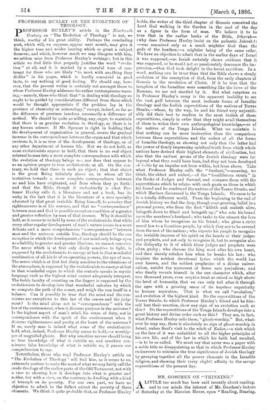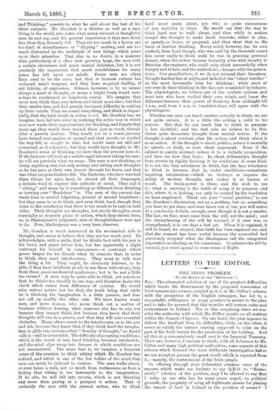MR. GOSCHEN ON "THINKING."
ALITTLE too much has been said recently about reading, and to our minds the interest of Mr. Goschen's lecture of Saturday at the Mansion House, upon "Reading, Hearing, and Thinking," consists in what he said about the last of his three subjects. Mr. Goschen is a thinker as well as a man living in the world, who notes what many eminent or thoughtful men do and say, and his general impression is that men think less than they formerly did. They are too much in a hurry, are too fond of miscellaneous or " dipping " reading, and are too much distracted by the multitude of new things which press upon their attention. That idea is, no doubt, in a measure true, particularly of a class now growing large, the men with a certain cleverness and great mental indolence, but it is not precisely the impression that much watchfulness for many years has left upon our minds. Fewer men are silent than used to be the case; but that is because culture has unloosed men's tongues, and they have acquired facility, if not felicity, of expression. Silence, however, is by no means always a mark of thought, or many a bright brain would now- a-days be condemned as hopelessly empty. We imagine that more men think than ever before, and think more also; but that they resolve less, and find greatly increased difficulty in making up their minds. They see round everything, and think so impar- tially, that the total result in action is nil. Mr. Goschen has, we imagine, been led into error by noticing the active way in which men now waste their opportunities for thinking, and forgets that years ago they would have wasted them just as much, though after a passive fashion. They would not in a coach-journey have turned over papers, or opened and shut novels, or studied the way-bill, or sought to chat, but would have sat still and composed, as if reflective; but they would have thought, in Mr. Goschen's sense of thinking, no more than the present men do. If the lecturer will look at a middle-aged labourer taking his ease, he will see precisely what we mean. The man is not thinking, or doing anything else, but only resting, and letting such thoughts as he has pass at their own leisure through his brain, and that was what our grandfathers did. The Easterns, who have watched these things for ages, have, in almost all their languages, a definite word to express this attitude of mind. They call it "sitting," and mean by it something as different from thinking as turning over " Bradshaw" is. The men of the present day waste time in mental fidgetting, instead of mental torpidness ; but they seem to us to think, and even think hard, though they come to the conclusion that there is too much to be said on both sides. Their thoughts are thoughts, but sterile thoughts, more especially as respects plans of action, which they shrink from, as, in Shakespeare's judgment, men of thoughtfulness were apt to do. Now, Shakespeare was a very keen observer.
Mr. Goschen is much interested in the mechanical aids to thought, and seems to believe that they are too much used. He acknowledges, with a smile, that he thinks best with his pen in his hand, and paper before him, but has apparently a slight contempt for himself in consequence,—a contempt which grows deeper for his friends when he remarks that, in order to think, they need interlocutors. They want to talk over the thing a bit. They ought, he obviously believes, to be able, if they have intellects at all, to use them without any help from those quasi-mechanical appliances ; but is he not a little too severe P A man may be quite able to think, yet conscious that he thinks too steadily in one way, and therefore desire the check which comes from difference of opinion. He would miss serious points but for that, the truth being that while he is thinking his imagination is a little passive, and does not call up readily the other side. We have known many men, and more women, who never think out a matter of business without hearing what someone else has to say, not because they cannot think, but because they know that their thoughts will run in a groove, and that they will miss essential obstacles. Many others resort to the interlocutor, or to the pen and ink, because they know that if they think hard the tempta- tion to glide into reverie—that "Sunday of thought," as Amiel calls it—will be irresistible. The difficulty of accepting conditions, which is the secret of true hard thinking, becomes intolerable, and the mind slips away into dreams in which conditions are not encountered. The same fear is, we imagine, a frequent cause of the aversion to think sitting which Mr. Goschen has noticed, and which is one of the few foibles of the mind that men can easily be induced to confess. The man walks about, or even takes a walk, not so much from restlessness as from a feeling that sitting is too favourable to the imagination. If he sits, he will fall into reverie, which is not thinking any more than gazing at a prospect is action. That is certainly the case with the present writer, who to think
hard must move about, yet who is quite unconscious of any inability to think-. He would say that the way to think hard was to walk about, and then while in motion compel the thought to make itself concrete, either in plan, or speech, or letter, or proposal, and then treat that as the basis of further thinking. Every mind, however, has its own method, from Lord Gough, who was said by the Generals round him never really to think until he was in pressing personal danger, when his orders became instantly alive with insight, to Briasley, the engineer, who could only think successfully when hungry and in bed ; and the method, too, changes with the genera- tions. Our grandfathers, if we do not misread their literature, thought hardest late at night, and talked of the "silent watches as the most favourable time for thinking ; while most of our sons do their thinking in the day, not unassisted by tobacco. The physiologists, we believe, are of the modern opinion, and most men who have studied their own minds, and know the difference between their power of thinking from midnight till 4 a.m., and from 4 a.m. to breakfast-time, will agree with the physiologists.
Whether one man can teach another actually to think, we are not quite certain. It is a little like adding a cubit to his stature. But that he can teach him to think to purpose. is leas doubtful; and the first rule we believe to be this. Never quite dissociate thought from mental action. If the thought is about conduct, plan the action, and think about it as an action. If the thought is about politics, reduce it mentally to speech, or draft, or even short argument. Even if the subject be purely abstract, reduce it to a definite proposition, and then see how that looks. In short, differentiate thought from reverie by rigidly limiting it by conditions of some kind. It is not the lazy reluctance to think, but the lazy reluctance to think in harness, that is, under conditions—sometimes requiring information—which so destroys or impairs the utility of modern thought, and makes it so barren of result. The brain-power is there, and the wish to use it ; what is wanting is the habit of using it to purpose, and this, where it is lacking, can only be created by the resolution we have meptioned. Think out your "social problem," to use Mr. Goschen's illustration, not as a problem, but as something you have to get done, and nine times out of ten you will arrive at a conclusion definite enough, even though it is not a resolve. The last, we fear, must come from the will, not the mind ; and the strengthening of the will by counsel, if it ever was so strengthened, is in our days a lost art. When it is regained, it will be found, we suspect, that faith has been regained too, and that the counsel has been useful because the counselled had previously accepted what the theologians call the categorical imperative as binding on his conscience. To educate the will by counsel, you must appeal to some sense of Right.



































 Previous page
Previous page